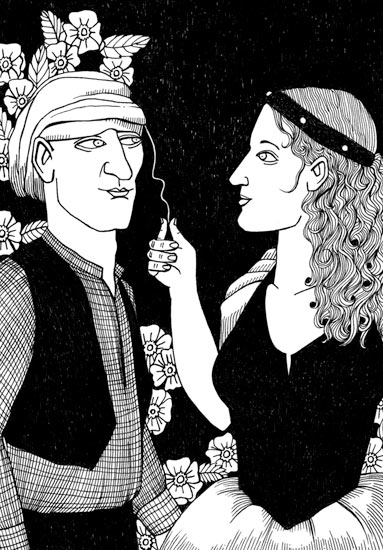Anyone remembers the article from
The Guardian that has been going around on social media sites since 2012? (Yes, it really has been 2 years, and I still receive the link from well-meaning friends and acquaintances at least once a week). The headline read
"Five Hundred New Fairy Tales Discovered in Germany," and was enticing enough to permanently stick in the Internet pipelines.
Here is some related news you might not have heard yet: 150 of those legendary 500 are now available in English translation, as part of a bilingual publication called
Original Bavarian Folktales: A Schönwerth selection (translated by Charlotte M. Wolf, PhD). Brand spanking new, this book came out in March 2014, and received a lot less of the well-deserved attention than the Guardian article. Go figure.
So, what's all the hoopla really about?
Let me burst the bubble first: The "Five Hundred" are not, in fact, all "new" fairy tales. They were collected by a wonderful gentleman called Franz von Schönwerth in the 19th century, and they have been preserved in his estate along with hundreds of pages of linguistic notes and other interesting information. And when you read them you can find many that have very close variants in other collections of folktales - and I am not even only talking about Grimm. So, strictly speaking, the 500 are not as mint-shiny as you might have thought they are.
With that said: They are awesome.
We learn from the introduction to the English translation that Schönwerth was, in fact, a very thorough collector. He gathered all his stories from one specific region (the Upper Palatinate of Bavaria), and mostly listened to what the everyday people of the villages had to say. The result is an amazing kaleidoscope of stories that paint a world full of magic: Spirits of Earth (dwarves and giants), Water (nixies and mermaids), Fire (will-o-whisps), and the Forest (Forest Maidens and Gnomes); legends of the Sun and the Moon, of the Mountains, lore of Witches and Wizards, and even remnants of German mythology. You will have to read the whole thing for yourself, but I'll give you some of the highlights that stuck with me:
1. A folktale where the pretty girl is the mean one, and the homely girl is the kind one, and it doesn't change in the end.
2. A "prequel" to a Czech folktale I included in my book, explaining the origin of all the superpowers of the Extraordinary Helpers of the hero (traditional folk superhero origin story? Damn right!)
3. A folktale about a human family that befriends the mountain dwarves; the women end up being midwives to each other's children, the human lady even breastfeeds a baby dwarf, and when one of the dwarves asks for a human girl's hand in marriage, he is politely refused, and the friendship does not suffer from it at all. I was reading it, waiting for a conflict that never came.
4. A funny folktale about what would happen if flour fell from the sky instead of snow.
5. Two haunting variations of the
Melusine legends where a mermaid marries a human man.
There are many, many more that I could mention. Most of these tales are less "elegant and sophisticated" than the Grimm tales - in exchange, they have a local flavor and a world teeming with magic that makes you love them. They show a lot more compassion and harmony between people and nature, vivid imagination, and a deep love for storytelling.
Next time you see the Guardian article pop up, link the book to others that might like it!
As usual, you can find Csenge (@TarkabarkaHolgy) at:
The Multicolored Diary - Adventures in Storytelling
MopDog - The crazy thing about Hungarians...
Her book, Tales of Superhuman Powers, a collection of folktales that feature superpowers, is available on Amazon.com.






